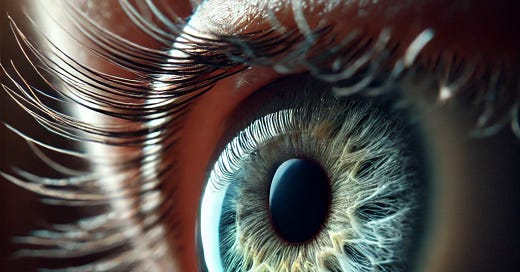Please hit the ❤️ at the top or bottom of this email to help others discover All About Vision With Dr. Kondrot. Your subscription directly supports my ongoing humanitarian work—delivering free eye surgeries and care where it's needed most.
Burning eyes at night can be an uncomfortable—and sometimes alarming—experience. Many patients tell me they feel fine throughout the day, only to be met with a sudden wave of eye irritation, stinging, or dryness once the sun goes down. If this sounds familiar, you're not alone.
Let’s explore the underlying causes of nighttime eye burning and walk through both mainstream medical and holistic/natural approaches to help you find long-term relief.
🔍 1. Dry Eye Disease: The Usual Suspect
What’s Happening:
Dry Eye Disease (DED) is one of the most common culprits. At night, tear production naturally decreases, and if you’re already prone to dry eyes, this drop can lead to intensified burning, stinging, or a gritty feeling.
Mainstream Approach:
Artificial tears: Preservative-free lubricating drops used before bedtime.
Ointments or gels: Thicker lubricants that coat the eye surface overnight.
Punctal plugs: Tiny inserts that block tear drainage to retain moisture.
Prescription drops: reduce inflammation and boost natural tear production.
Holistic/Natural Approach:
Omega-3s: Essential fatty acids reduce inflammation and improve meibomian gland function. Flaxseed oil or fish oil supplements can be helpful.
Hydration: Ensure you're drinking enough water throughout the day.
Humidifiers: Running one in your bedroom can counteract dry indoor air.
🌬 2. Meibomian Gland Dysfunction (MGD)
What’s Happening:
MGD is a blockage of the oil-producing glands in your eyelids, leading to unstable tear film and evaporative dry eye, especially noticeable at night.
Mainstream Approach:
Warm compresses: Daily use loosens clogged oils.
Antibiotic eye drops or oral doxycycline: Used to reduce inflammation and bacterial overgrowth.
Holistic/Natural Approach:
Eyelid hygiene: Gentle lid scrubs using diluted tea tree oil or hypochlorous acid spray.
Dietary support: Zinc, vitamin A, and B-complex support oil gland function.
💤 3. Nocturnal Lagophthalmos (Sleeping with Eyes Slightly Open)
What’s Happening:
Some people don’t fully close their eyelids while sleeping, causing the eye surface to dry out and burn by morning.
Mainstream Approach:
Moisture goggles or eye masks: Create a seal to retain moisture.
Medical taping: Gentle tape can help keep eyelids closed at night.
Surgical correction: In severe cases, eyelid surgery may be required.
Holistic/Natural Approach:
Aloe vera gel: Natural lubrication with anti-inflammatory properties (use medical-grade, preservative-free).
Lavender oil (on pillowcase): May relax facial muscles and encourage complete eyelid closure.
👁 4. Ocular Surface Inflammation or Allergy
What’s Happening:
Inflammation or allergic reactions (to dust mites, pillow fabrics, or airborne allergens) can irritate the eyes at night.
Mainstream Approach:
Antihistamine or mast-cell stabilizer drops: Help reduce allergic symptoms.
Steroid eye drops: Reserved for short-term inflammation control under physician supervision.
Holistic/Natural Approach:
Cold compresses: Soothe inflammation and itchiness.
Saline rinses: Help remove allergens before bed.
Change pillowcases regularly: Choose hypoallergenic materials and wash with non-toxic detergents.
🖥 5. Digital Eye Strain Carryover
What’s Happening:
Prolonged screen use during the day can suppress blinking and reduce tear film quality, resulting in a delayed burning sensation at night.




